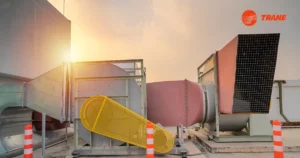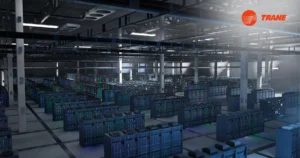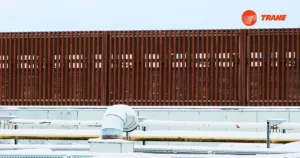In recent years, Iraq has witnessed rapid urbanization, large-scale infrastructure development, and industrial expansion. With this growth comes a pressing challenge that often goes unnoticed until it becomes urgent; how to manage rising heat levels in a region where temperatures routinely soar above 45°C during the summer. The demand for reliable cooling systems has never been greater, leading many businesses and facilities to explore chiller rental options as a practical, cost-effective solution. Renting chillers allows industries to maintain operations smoothly during peak demand without committing to long-term capital investments, which is a significant advantage in Iraq’s evolving energy landscape.
The Growing Pressure on Cooling Infrastructure
The Middle East already consumes nearly 70 percent of its electricity for cooling purposes, according to the International Energy Agency. Iraq is no exception, where surging population numbers and rapid industrialization are putting unprecedented pressure on the national grid. Hospitals, data centers, manufacturing facilities, and even construction sites now rely on cooling not only for comfort but also for safeguarding equipment, processes, and human health.
When demand spikes, permanent systems often fall short or suffer breakdowns. This is where rental solutions are stepping in. Instead of waiting weeks for new permanent systems to be installed or upgraded, businesses are opting for chillers that can be deployed within days. For many organizations, this shift is not just about efficiency but about survival during the harshest summer months.
The Rise of Air Cooled Chiller Systems in the Region
While rental systems come in many forms, the air cooled chiller has gained particular traction in Iraq’s market. Unlike water-cooled models, these units do not require a constant water supply, making them highly practical in a region where water scarcity remains a major concern. According to the United Nations, Iraq has faced water availability declines of nearly 40 percent over the past two decades. In such an environment, solutions that minimize water consumption while delivering reliable cooling are increasingly preferred.
Air cooled systems are versatile, easier to install, and require less infrastructure compared to water-cooled setups. For industries like food processing or healthcare, where downtime is not an option, the ability to quickly deploy an efficient unit can make all the difference. This explains why rental providers across Iraq, including global leaders like Trane, are expanding their fleets of air cooled chillers to meet the surging demand.
Trane Iraq’s Contribution to Reliable Cooling
Trane has been present in the region for decades, providing both permanent and temporary cooling solutions. In Iraq, Trane’s expertise is proving invaluable for sectors that cannot afford interruptions. From ensuring stable cooling for pharmaceutical storage to supporting emergency needs in large commercial buildings, Trane’s rental fleet provides flexibility without compromising reliability.
One notable instance was during a major construction project in Basra where delays threatened to push timelines into the peak summer season. The site required immediate large-scale cooling for both worker comfort and sensitive equipment protection. Trane Iraq provided a rapid deployment of rental chillers, ensuring that operations continued seamlessly and deadlines were met despite the harsh weather.
Cooling Demand Beyond Industry
It is not just factories or data centers that are turning to rental solutions. Shopping malls, educational institutions, and even temporary events such as exhibitions or sporting gatherings are recognizing the value of having access to scalable cooling. In a country where the summer heat can be unforgiving, these temporary measures help maintain comfort and safety, which in turn contributes to economic activity and social engagement.
According to a recent regional survey, more than 60 percent of businesses in Iraq now consider flexibility in cooling systems a strategic requirement rather than an optional add-on. This cultural shift in how cooling is perceived highlights the growing role of rentals in shaping Iraq’s energy and business landscape.
Looking Ahead: A Market in Transition
As Iraq continues to modernize its infrastructure, the reliance on efficient cooling will only deepen. The future will likely see a combination of sustainable design, renewable integration, and smarter deployment of cooling assets. Rental solutions, particularly those that emphasize energy efficiency and low environmental impact, will remain vital for bridging gaps between immediate needs and long-term infrastructure upgrades.
In this evolving environment, providers like Trane Iraq are uniquely positioned. With a reputation for dependable engineering and an expanding portfolio of sustainable solutions, Trane is enabling organizations to adapt quickly while maintaining resilience against environmental challenges.
Conclusion: Building Cooling Resilience in Iraq
The story of Iraq’s development cannot be separated from its need for reliable cooling. From rapid industrialization to the everyday well-being of its people, effective temperature control plays a decisive role in the country’s progress. The growing demand for chiller rental reflects not only an urgent response to today’s challenges but also a broader shift toward flexible, responsive infrastructure.At the same time, innovations like the air cooled chiller are proving crucial in regions where resources such as water are under pressure. By combining global expertise with local responsiveness, companies like Trane Iraq are ensuring that businesses and communities can stay productive, safe, and comfortable even as the climate grows harsher and demands on infrastructure continue to rise.




